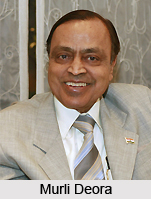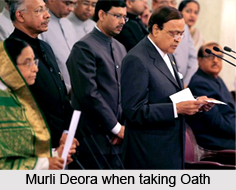 Murli Deora, an Indian Politician, belonged to the Indian National Congress. For 22 years from 1981 to 2003; he served as the President of the Mumbai Regional Congress Committee. By profession he was an Industrialist. Murli Deora was the Union Minister of Corporate Affairs of the country till 12 July 2011.
Murli Deora, an Indian Politician, belonged to the Indian National Congress. For 22 years from 1981 to 2003; he served as the President of the Mumbai Regional Congress Committee. By profession he was an Industrialist. Murli Deora was the Union Minister of Corporate Affairs of the country till 12 July 2011.
Early Life of Murli Deora
Shri Murli Deora was born on 10th January 1937 to father Shri Sitaram Deora and mother Shrimati Gigibai Deora at Mumbai (Maharashtra). He was from Deora Chauhan Rajput community. He was educated at Bharatiya Vidya Bhavan`s College, and did his B.A. from Chowpatty and Jaihind College, Mumbai (Maharashtra).
Political Career of Murli Deora
In 1968 Murli Deora began his political career as a politician. Later he became the Mayor of Mumbai with the support of the Shiva Sena.
Throughout his political career the different positions that he held are:
1968-78 Municipal Councillor, Municipal Corporation of Mumbai
1977-78 Mayor of Mumbai
1982-85 Member, Maharashtra Legislative Council, Director, Life Insurance
 Corporation, Chairman, Maharashtra. Small Scale Industrial Development
Corporation, Chairman, Maharashtra. Small Scale Industrial Development
Corporation 1985-89 Member, Eight Lok Sabha
1989-91 Member, Ninth Lok Sabha
1991-96 Member, Tenth Lok Sabha International President, Parliamentarians for Global Action, New York
1998-99 Member Twelfth Lok Sabha
2002 Elected to Rajya Sabha. He has also been the Vice-President of International Federation of Red Cross and Red Crescent Societies, Geneva and the Vice-Chairman of Indian Red Cross Society.
2006 Minister of Petroleum and Natural Gas
2009 continued as Minister of Petroleum and Natural Gas
Social Work of Murli Deora
For the last several years, Murli Deora was involved in social work. He organized several eye camps. He has served as the as Vice-Chairman of the Gandhi Institute of Computer Education and Information Technology of Bharatiya Vidya Bhavan. He is also credited with starting in over 30 cities in India free computer training for the poor and under privileged youth. Also as the Vice-Chairman of the Indian Red Cross Society Deora has helped and mobilized relief work during natural/man made calamities.
Personal Life of Murli Deora
On 11 December 1970, he was married to Shrimati Hema Deora and the couple has two sons. His son Milind Murli Deora was a Lok Sabha member from Mumbai. He died on 24th November 2014.




















